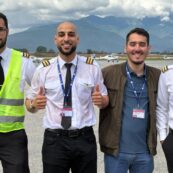Big Data in Aviation Training: Enhancing Safety and Efficiency

In the age of big data, the inflow of structured and unstructured information has been a critical enabler of:
- productivity,
- accuracy, and
- strategic growth across a spectrum of industries.
This requisite has ventured into airline pilot training in aviation, where safety and operational precision are paramount. Developments involving real-time analytics, machine learning, and predictive learning algorithms have transitioned aviation training avenues. Furthermore, they helped towards finely tuning precision, adaptability and competency evaluation. Through the use of real-time data analysis, machine learning, and predictive algorithms, flight training methods are rapidly modernising to offer enhanced accuracy, flexibility, and all-round hard and soft skill sets.
Introducing data-driven insight can:
- pinpoint training gaps,
- simulate the most challenging circumstances in real-time, and
- provide information to prioritise weaknesses and fine-tune pilot performance.
As aviation technology advances and becomes more widespread, big data is becoming even more integral to cultivating the most professional, proficient pilots possible. Thus we will analyse the revolutionary role of big data in airline pilot training, examine its most relevant use cases, and evaluate developments at the forefront of education in aviation.
Key Applications of Big Data in Aviation
With big data becoming a top priority for airlines, the face of international aviation, and consequently airline training is rapidly changing. The ability to process and analyse data in large volumes offers opportunities that can help enhance safety, create personalised learning experiences and spur progress in many areas, including:
Proactive Safety Management and Anomaly Detection
Big data enables real-time monitoring of flight data, an indispensable part of safety assurance. Analysing data collected from flight simulations, aircraft performance, and air traffic control systems, can help identify safety hazards in advance so that timely prevention can be carried out. This prediction can help pilots and ground crew address adverse issues in advance, reducing the likelihood of accidents.
In addition, big data-enabled anomaly detection systems can identify irregular data patterns that may indicate an error or even potential risk. This can mitigate the risk of accidents and safety concerns.
Machine-Driven Learning Algorithms for Personalised Pilot Training
Another exciting application that big data facilitates in the field of aviation is the use of machine learning algorithms for individualising pilot training. Every pilot has different learning requirements and big data now enables training programmes to be constantly tailored to individual performance. By examining flight simulator results, air traffic behaviour and even previous pilot training sessions, instructors can make adjustments to the training programme to practice areas where individual pilots struggle. This ensures a more precise and effective way of learning.
Through this approach, trainers of Egnatia Aviation not only optimise the training process but also provide a more flexible environment in which pilots can learn and grow at their own pace.
Research and Innovation Projects
Big data plays a crucial role in the development of new systems and techniques in the aviation industry as well. Research centres use data analytics to test complex models, validate systems, reproduce flight conditions, and examine critical flight parameters. The large volume of data generated and processed for these research activities leads to valuable findings that can improve flight processes, safety, and fuel consumption.
This is essential to optimising flight training and developing the next generation of technology shaping the future of the industry.
How Egnatia Aviation Leverages Big Data
Egnatia Aviation is leading the way when it comes to the application of big data in pilot training. The flight academy harvests information from a wide variety of sources including flight simulators, lessons and real-life flights, before using advanced analytics to continually adapt their modules.
Collection and Analysis of Cadet Performance
At Egnatia Aviation, we collect data from the flight school, flight simulators, air traffic control systems, and training sessions, which we then use to analyse pilot performance, validate training concepts and methods, and study use cases and outcomes for future improvement. We also analyse student flight data from research programmes at Egnatia Aviation’s Research Centre at Lydia Aerodrome, to examine and improve data use in pilot training. This enables us to provide each student with the best possible training experience.
Benefits for Students, B2B Partners, and Flight Instructors
Big data means a wealth of benefits for Egnatia Aviation’ cadets, B2B partners, and teachers. For students, the personalised learning paths created from big data insights offer better, focused training to develop pilots to meet today’s soaring standards with more speed and efficacy. For B2B partners like Aegean Airlines, Iraqi Airways, Olympic Air, and Wizz Air, big data generates a clear view of an organisation’s workforce, creating the opportunity to make educated decisions on training requirements and workforce upskilling. For flight instructors, data-driven feedback provides them with real-time intel on student progress, allowing them to adapt their approach to make the learning process as efficient as possible.
Equitable with Egnatia Aviation’s forward-thinking initiatives, the flight training academic has designed, and continuously optimising, the Airline Integrated Course, allowing training to be tailor-made based on big data insights to meet modern airlines requirements and qualifications. This programme guarantees that the students are fully integrated and ready to undertake duties as an airline pilot.
Enhancing Safety and Efficiency: Personalised Learning with Big Data
Big data boosts safety and efficiency in aviation, but it also has a major impact on acquiring the necessary soft skills (competencies) during pilot training. Through personalised training, big data offers more efficient training paths, which ultimately leads to better decision-making, and performance.
Improved Decision-Making and Training Customisation
Big data allows for smarter decision-making in the classroom and the cockpit. When an instructor can see how a student performed in past training sessions, they can see what areas they struggled in and provide more assistance making the overall training more focused. This means that each student gets the most relevant and effective training for their personal training needs.
Included in Egnatia Aviation’s education, training simulators provide real-time information, enabling tutors to make quick decisions for training. Good decision-making is another important aspect of safe flying.
Future Trends in Big Data in Pilot Training
Given the rapid advancements in technology, the role big data plays in pilot training will continue to grow. As machine learning and artificial intelligence continue to mature, the level of precision in personalised training will only get higher. New technology trends like augmented reality (AR) and virtual reality (VR) are likely candidates to be incorporated into pilot training, taking the hands-on training up a notch. In the future, we can expect even more sophisticated big data analytics tools to be used in aviation training to drive better learning outcomes and efficiencies in pilot training.
Emerging Technologies and Their Potential Impacts on Aviation Training
These emerging technologies have the potential to greatly improve the efficiency of aviation training. AI, machine learning, augmented reality and virtual reality are only a few technologies that have the power to change how we train pilots —building a more immersive and data-driven training experience.
How Egnatia Aviation Stays Ahead in Aviation Training
Egnatia Aviation focuses on the introduction of new technologies by collaborating with leading research centres and universities. By teaming up with key partners at Lydia Aerodrome-founded research centre, including the Hellenic Institute of Transport (HIT) and the Centre for Research and Technology Hellas (CERTH), investing in ground-breaking programmes like DEMOQUAS and HAIKU to enhance aviation safety and operational excellence, Egnatia Aviation ensures that they always deliver state-of-the-art training equipment and technology available, better preparing their students for the future of flight. Furthermore, Egnatia Aviation’s investment in Alsim simulators is crucial for recognising new market trends and their effects on the operation, as simulators provide realistic scenarios and advanced training tools.
Through collaboration with research institutes, Egnatia Aviation introduces the latest technologies in aviation, offering realistic training environments that help their students be prepared for future challenges and opportunities in the aviation sector.
Shaping the Future of Aviation Training with Big Data
Big data is reshaping the landscape of aviation training, and the developments have far-reaching benefits for safety, efficiency and student engagement. Through the use of personalised training programmes, and data-informed decision-making, Egnatia Aviation is ahead of the curve in the future of pilot training. With rapidly changing technology, big data will continue to be an essential aspect of the curriculum to prepare students for a growing list of future challenges.
If you want to become a part of one of the most forward-thinking, data-led training programmes available, Egnatia Aviation offers the perfect opportunity. With a focus on big data, innovation, and personalisation, Egnatia provides its students with the lessons and experience they need to make the most of an ever-changing industry.




